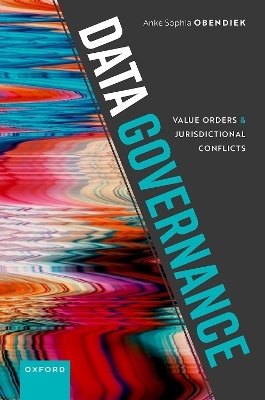
Data Governance
Oxford University Press (Verlag)
978-0-19-287019-3 (ISBN)
In our interconnected world, digital data turn into a central political issue. They are simultaneously important tools for security agencies, a valuable economic resource for businesses, and they have crucial relevance for individual's rights. As multiple actors extend claims of their legitimate control, conflicts emerge. Data Governance: Value Orders and Jurisdictional Conflicts argues that such conflicts about the collection, transfer, and sharing of digital data have an underestimated - and undertheorized - normative dimension. The book suggests that, while public and private actors are united by the assumption that the governance of data is meaningful in the pursuit of societal goals, they have conflicting visions of what it is precisely that data governance should achieve or avoid, and, in fact, what data actually are. The book offers an innovative conceptual and empirical framework - embedded in international political sociology - to analyse and assess overlapping claims of legitimate control over data. Five case studies provide an in-depth perspective on central conflicts between the major regulatory powers, the European Union, the United States, and private tech companies.
Data Governance traces patterns of change and continuity in the disputes about the transatlantic commercial data agreements, counterterrorist data sharing in air travel and finance, law enforcement access to electronic evidence, and data removal under the right to be forgotten. It shows that the central normative questions at the heart of these conflicts remain remarkably stable over time. Actors are torn between competing goals of prioritizing security, economic progress, or individual rights, and they face choices between exercising their sovereignty and enabling global cooperation. As a growing number of countries adopt data governance provisions, this book offers a fresh perspective to capture the competing societal visions at play.
Anke S. Obendiek is a postdoctoral researcher at the Centre for European Integration Research at the University of Vienna. She received her PhD from the Hertie School in 2020. Previously, she was a research associate in the DFG-funded project Evolving Internet Interfaces: Content Control and Privacy Protection at the Hertie School and a research affiliate at the Berlin Graduate School for Global and Transregional Studies. She holds a postgraduate degree in International Relations Theory from the London School of Economics and Political Science and an undergraduate degree in Political Science from the University of Hamburg.
1: Introduction: Jurisdictional Overlap in Data Governance
2: Theorizing the Resolution of Jurisdictional Conflicts
3: Value Orders and the Genesis of the Field of Data Governance
4: Safe Harbour and its Discontents: The Empowerment of Individuals in the EU
5: Passenger Data in Air Travel: Establishing Data as a Security 'Tool'
6: Financial Data Sharing: The Extended Arm of the US Treasury
7: Access Denied? Struggles over Electronic Evidence
8: The Right to Be Forgotten: Moral Hierarchies of Fairness
9: Conclusion: Normative Visions Across Jurisdictional Conflicts
| Erscheinungsdatum | 04.11.2022 |
|---|---|
| Verlagsort | Oxford |
| Sprache | englisch |
| Maße | 164 x 241 mm |
| Gewicht | 612 g |
| Themenwelt | Recht / Steuern ► EU / Internationales Recht |
| Sozialwissenschaften ► Politik / Verwaltung ► Staat / Verwaltung | |
| Wirtschaft ► Volkswirtschaftslehre ► Wirtschaftspolitik | |
| ISBN-10 | 0-19-287019-X / 019287019X |
| ISBN-13 | 978-0-19-287019-3 / 9780192870193 |
| Zustand | Neuware |
| Informationen gemäß Produktsicherheitsverordnung (GPSR) | |
| Haben Sie eine Frage zum Produkt? |
aus dem Bereich


